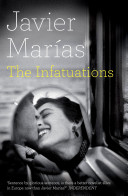Javier Marías: The Infatuations
 The young woman, María has her breakfast in the same café for years – and for years she keeps watching a married couple who also spend all their mornings there. She doesn’t interfere with them, she doesn’t stare at them rudely – she simply likes to see them together every morning, since they are a fascinating couple, and it’s evident at first sight that they love each other and greatly enjoy each other’s company and conversation. Then one day they fail to turn up at the usual hour, and months pass before the wife finally reappears – alone. In the meantime, María learned that the husband had been murdered, and when the widow is left alone at her table, María cannot resist the temptation: she goes over to the woman and offers her condolences, because after years of spending her mornings in the company of the couple, she feels that the widow is not a perfect stranger to her.
The young woman, María has her breakfast in the same café for years – and for years she keeps watching a married couple who also spend all their mornings there. She doesn’t interfere with them, she doesn’t stare at them rudely – she simply likes to see them together every morning, since they are a fascinating couple, and it’s evident at first sight that they love each other and greatly enjoy each other’s company and conversation. Then one day they fail to turn up at the usual hour, and months pass before the wife finally reappears – alone. In the meantime, María learned that the husband had been murdered, and when the widow is left alone at her table, María cannot resist the temptation: she goes over to the woman and offers her condolences, because after years of spending her mornings in the company of the couple, she feels that the widow is not a perfect stranger to her.
María’s friendly words then set off a whole chain of events and relationships: the widow, Luisa invites her to her home, and talks to María about her pain, bereavement and grief with surprising honesty. During her visit, María briefly encounters Javier, an old family friend, and later on they strike up an affair with no hidden catch, no strings attached. However, María would love to engage in a more serious relationship with Javier, who, in turn, would like to win Luisa’s heart – and he’s very determined to achieve his aim.
I know this sounds a bit like the plot of a complicated, soap-opera-like love story where everyone’s heart breaks for someone else, but only „complicated” is true here. And not in any negative sense – the novel is complicated simply because nothing is ever simple or clean-cut in Javier Marías’s stories. In his fictional world, every relationship and every conversation can lead to a virtually infinite number of questions, doubts and alternative stories – because no-one can ever be perfectly sure that what he learns about the other person is indeed the truth, a part of the truth, a version of the truth, or simply a lie (or fiction). In spite of this, his characters always crave for knowledge, and they're willing (or prone) to accept / believe the stories they hear – and if there are no stories told, they invent some which sound pleasant or authentic enough for them.
The characters of this novel are also enchanted by stories (fictions). Javier, for example, while telling María about his love for Louisa and about his hopes of securing the disconsolate widow’s heart sooner or later, keeps referring to a novella by Balzac – basically he's assuming that the fictitious story somehow substantiates his real (not fictitious) emotions and plans. Or we can take María as well: she works for a book publisher, so by definition she is closely connected to fictions and made-up truths. During her conversations with Louisa and Javier, María is prone to filling out the gaps in their stories by inventing long conversations and complicated chains of events. Her fictitious conversations and background stories often bear an uncanny resemblance to reality, and it often happens that we only realize 200 pages later – when the truth (or a different fiction) is revealed – that the story we read earlier was „only” a figment of María’s imagination. However, these figments of imagination sound just as believable and authentic as the truth.
And even though the concrete events of the novel could easily be summed up in a couple of sentences, it would be nearly impossible to summarize all these „alternative” stories. And it wouldn't be worth the effort to try this anyway, since the hypnotic effect of the novel mainly derives from these – and from Javier Marías's wonderfully complex, repetitive, sprawling sentences. And also from what these delightful, uncanny, magical sentences convey: that despite all ambiguity, infatuations do exist – and they dissolve all doubt in the minds of those who experience them.





